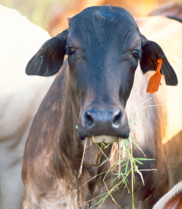Methane has 23X the impact on warming as CO2 and is caused by plants and animals - as impractical as shutting down all commerce sounded to sane people not in the anti-science environmental movement, cutting down the Amazon to remove dead plants causing methane was equally silly.
And genetically engineering cows that burp less sent yet another anti-science fringe into apoplectic fits.
So we haven't made any progress at all in stopping climate change but the vegetarians who insisted driving to the store caused less global warming than walking to the store if you are an evil meat-eater are being forced to revise their junk science yet again; a new study shows cows are more climate friendly than previously believed, which means much more climate friendly than voodoo math by vegetarians had claimed. Not to mention that cows are vegetarians, so their methane production occurs because they eat all plants.
Research from the Commonwealth Scientific and Industrial Research Organisation (CSIRO) in Australia indicates that the amount of methane emitted from cattle fed on the tropical grasses in northern Australia is up to 30 percent less than figures cited. That's a big difference.

"I am not the enemy". But you are responsible for around 200 grams of methane a day, or about 1.5 tons of CO2 equivalents a year, because you are vegetarian. Photo: CSIRO
It's also just in a lab setting. Just like every other claim regarding emissions, there is no way to actually know; no one is sticking respiration chambers up to cars, airplanes and animals worldwide so numbers are always projections, but the closer researchers can get to realistic projections the more confidence the public will have in statements and action plans.
What accounts for the difference? Feed, says researcher Dr. Ed Charmley. And that means it could be a win-win for everyone.
“CSIRO research also shows that northern cattle fed on a diet of predominantly Leucaena, a legume tree, emit less methane than cattle grazing on tropical grasses,” Charmley said. “What this nutrition research is showing is that there can be win-win scenarios for the industry and the environment if we can redirect the breakdown of plant material in a way that reduces the amount of methane produced while improving the amount of energy or weight gain that animals get from their feed."
Better numbers aren't a reason to let up on the cultural pressure - a 30% change in emissions from Australian cattle is only about 7.4 million tons, or roughly the amount of one large coal-fired power station, and agriculture is only 15% of the emissions Australia produces. But more accuracy is a good first step.




Comments